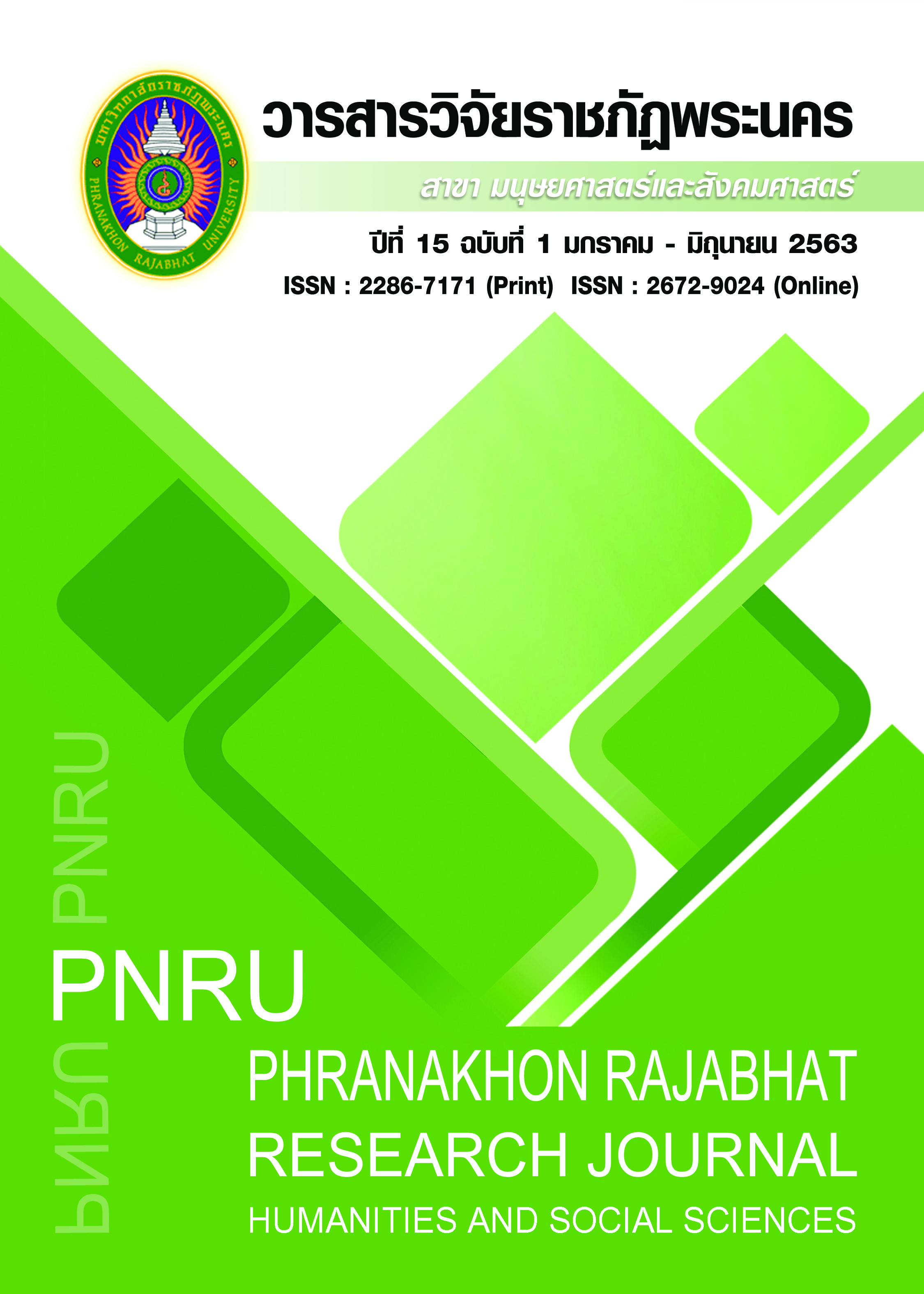EMBEDDEDNESS OF CSR MANAGEMENT AND THE KING’S KNOWLEDGE ENDORSEMENT AFFECTING CUSTOMER SUPPORT
Main Article Content
Abstract
To be successful for Social Business Enterprise, the economic, social and environmental value must be balancing based on the effectiveness of Strategic Human Resource Management, and Corporate Governance. From the empirical study, it was found that the managing dominant features of Doi Kham were the Embeddedness of Corporate Social Responsibility Culture and King’s Knowledge Endorsement. This study was conducted by using 300 sampling units from Thai people with age 17 – 35 years in Bangkok Metropolis. The theoretical conceptual framework consisted of 2 independent factors: The Embeddedness of Corporate Social Responsibility Culture (ECR) and the King’s Knowledge Endorsement (KKE); 2 intermediate factors: Corporate Image Perception (CP) and Mutual Gain Perception (MGP); and Customer Support as the dependent factor. It was found that the average value of all factors was the high level of awareness. The hypothesis testing found that ECR and KKE had a positive significant influence on CP and MGP with coefficient values of 0.643, 0.722, 0.589 and 0.289, respectively.
Article Details
Each publish articles were copyright by Phranakorn Rajabhat University
Any contents which appeared in each articles in the journal were authors personal opinion. It did not relate to Phranakorn Rajabhat University and other instructors in the university. Each authors would take responsibility on their articles. If there are any mistake, the authors will take responsibility themselves
References
Arsasongtham, J. (2012). Persuasion the Gen Y to work with happiness in organization. Executive Journal Bangkok University, 32(2), 202 – 208. (in Thai)
Cekada, T. L. (2012). Training a multigenerational workforce. Professional Safety, 57(3), 40-44.
Croitoru, A. (2012). Book review: Schumpeter, J.A., 1934 (2008), The Theory of Economic Development: An Inquiry into Profits, Capital, Credit, Interest and the Business Cycle. Journal of Comparative Research in Anthropology and Sociology, 3(2). 137-148.
Doi Kham Family. (2017). Doi Kham products. Retrieved January 17, 2017, from http://www.doikham.co.th/ (inThai)
Dwyer, L. & Kim, C. (2009). Destination competitiveness: determinants and indicators. Current issues in tourism, 6(5), 369-414.
Gerbing, D.W. & Anderson, J.C. (1993). Monte Carlo evaluations of goodness-of-fit indices for structural equation models. In K.A. Bollen, & J.S. Long (eds.), Testing structural equation models. Newbury Park, CA: Sage.
Hansen, J.I.C., & Leuty, M.E. (2012). Work values across generations. Journal of Career Assessment, 20(1), 34-52.
Hanson, D., & Stuart, H. (2001). Failing the reputation management test: The case of BHP. The Big Australian. Corporate Reputation Review, 4(2), 128-143.
Kotler, P. & Lee, N. (2005). Corporate social responsibility: doing the most good for your company and your cause. Hoboken, N.J: Wiley.
Kowalczyk, J. & Pawlish, M.J. (2002). Corporate branding through external perception of organizational culture. Corporate Reputation Review, 5(2/3), 159-174.
Ipe, M. (2003). Knowledge sharing in organizations: a conceptual framework. Human Resource Development Review. 2(4), 337-359.
Mahon, J., & Wartic. S. L. (2012). Corporate social performance profiling: using multiple stakeholder perceptions to assess a corporate reputation. Journal of Public Affairs, 12(1), 12-28.
Melewar, T. C. & Karaosmanoglu, E. (2006). Seven dimensions of corporate identity: a categorization from the practitioners’ perspectives. European Journal of Marketing, 40(718), 846-69.
Nguyen, N. & Leblanc, G. (2001). Corporate image and corporate reputation in customers’ retention decisions in services. Journal of Retailing and Consumer Services, 8(4),227-236.
Omar, M., Williams, R. & Lingelbach, D. (2009). Global brand market‐entry strategy to manage corporate reputation. Journal of Product & Brand Management. 18(3), 177-187
Michael, E. Porter & Mark, R. Kramer. (2002).The competitive advantage of corporate philanthropy. Harvard Business Review. 80(12), 48–62.
Staples S. & Sirkkal J., (2002). Toward contextualized theories of trust: role of initial trust in global virtual teams. Information Systems Research, Sep2004. 15(3).
Strandberg, C. (2004). Staffing CSR. Canadian co-operative association March 2004 concern for community newsletter. Canada: British Columbia.
Strautmanis, J. (2007). Acquiring corporate social responsibility approach through business study process. Riga: University of Latvia.
Sirijai, B. & Piriyakul, R. (2018). Internal corporate branding: a case study of Bangkok bank public company limited. Sripatum Review of Humanities and Social Sciences, 18(1), 27-36. (In Thai)
Suwanaopas, R. & Piriyakul, R. (2018). Effects of social enterprise strategy, organizational culture and knowledge management on the triple bottom line: The Evidence of Thai Social Enterprise. Ph.D. in Social Sciences Journal, 8(3), 214-229. (in Thai)
Jeffry A. Timmons, Stephen S. (2008). New venture creation: entrepreneurship for the 21st century. NY: McGraw-Hill/Irwin.
Tung, C. L., Hsing K. C. & Sheng W. (2004). To share knowledge or not to share: a social exchange theory perspective of virtual team members' behavior. Knowledge Economy and Electronic Commerce, 10, 34-56.
Larry J. Williams, Robert J. Vandenberg & Jeffrey R. Edwards. (2009). Structural equation modeling in management research: a guide for improved analysis. Journal The Academy of Management Annals. 3(1), 543-604.


